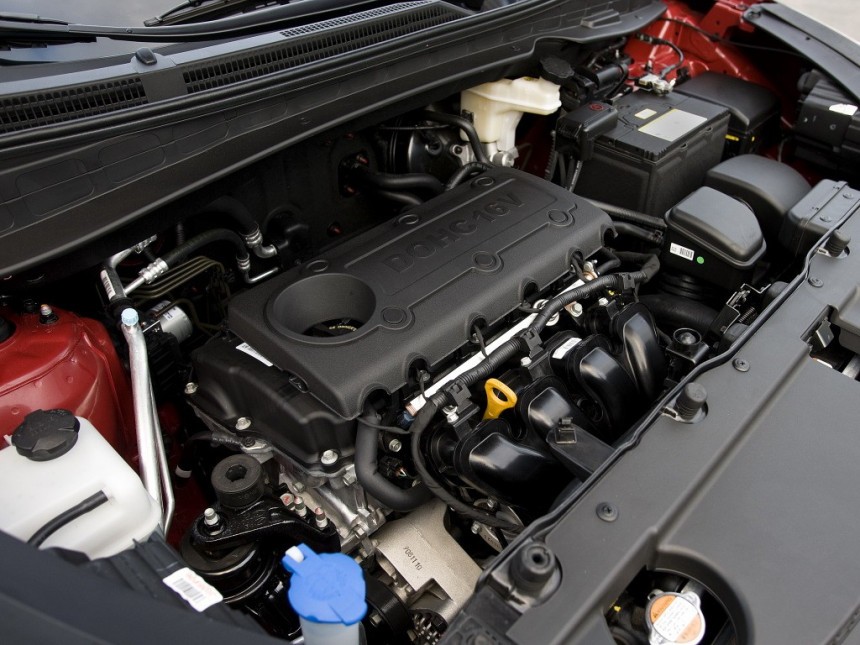What Kia calls HECU (hydraulic electronic control unit) in documents filed with the National Highway Traffic Safety Administration, sister brand Hyundai refers to as the anti-lock brake system module. As fate would have it, Hyundai Motor America has issued a mammoth safety recall encompassing more than 1.6 million vehicles due to a fire risk stemming from brake fluid leaking within the ABS module.
If the brake fluid makes a mess of the printed circuit board, the resulting electrical short leads to an overcurrent condition that increases the risk of a fire. Hyundai Motor America started investigating this problem in June 2019 after receiving a report of an overheated ABS module in an Elantra.
Come August 2019, the company became aware of another overheated module in a customer's Accent. Both modules were damaged beyond the ability to determine the root cause behind the underhood fires. The third confirmed incident followed suit in July 2020, involving a 2015 model year Elantra. Fast forward to September 2023, and the grand total is 21 vehicle fires in addition to 22 thermal incidents.
Think smoking, melting, and burning. Those 43 thermal incidents and fires occurred in the United States market alone between June 2017 and June 2023.
Remember the 2015 model year Elantra from July 2020? Its module was promptly shipped to South Korea, with Hyundai Motor Company's engineering department identifying an internal brake fluid leak. Even so, the automaker decided to investigate some more before deciding whether to recall or not.
Third-party engineering analysis firm Exponent started helping the Ulsan-based automaker in October 2021. The folks at Exponent discovered foreign contaminants in the residual brake fluid inside certain ABS modules, reporting said findings to HMC in May 2023. Two months later, Exponent also discovered O-rings with varying rubber material formulations. Certain formulations are prone to losing the rubber's hardness over time, resulting in internal brake fluid leakage.
Hyundai reviewed this information with the supplier of the ABS module, namely South Korea-based Mando. The part number of the suspect ABS module is 58900-*****, whereas the HECUs recalled by Kia to the tune of 1.7 million vehicles bear part numbers beginning with 58910 and 58920. It's not clear why Hyundai and Kia used asterisks to hide said part numbers, more so considering that all three versions have been discontinued from vehicle production.
In any case, Hyundai isn't aware of any crashes, injuries, or fatalities attributable to the described condition. As per the document attached below, the supplier improved the ABS motor shaft O-ring's material formulation in September 2014 at its South Korean plant and in February 2015 at its US plant.
Affected vehicles include the 2010 to 2013 model year Tucson, followed by the 2015 model year Tucson Fuel Cell, 2013 Santa Fe Sport, 2010 to 2012 Veracruz, 2014 to 2015 Equus, 2013 to 2015 Santa Fe and Elantra Coupe, 2012 to 2015 Accent, Veloster, and Azera, plus the 2011 to 2015 Elantra, Sonata Hybrid, and Genesis Coupe. Hyundai states that owners can continue driving said vehicles, although Hyundai also advises them to park outside and away from structures. Why?
As it happens, an ABS module fire can occur both while driving and when the vehicle is parked. The remedy doesn't come in the form of a replacement O-ring or ABS module, but a replacement ABS fuse rated at a lower amperage to limit the operating current.
Both dealers and owners will be informed of the supplier's blunder on or about November 21.
Come August 2019, the company became aware of another overheated module in a customer's Accent. Both modules were damaged beyond the ability to determine the root cause behind the underhood fires. The third confirmed incident followed suit in July 2020, involving a 2015 model year Elantra. Fast forward to September 2023, and the grand total is 21 vehicle fires in addition to 22 thermal incidents.
Think smoking, melting, and burning. Those 43 thermal incidents and fires occurred in the United States market alone between June 2017 and June 2023.
Remember the 2015 model year Elantra from July 2020? Its module was promptly shipped to South Korea, with Hyundai Motor Company's engineering department identifying an internal brake fluid leak. Even so, the automaker decided to investigate some more before deciding whether to recall or not.
Third-party engineering analysis firm Exponent started helping the Ulsan-based automaker in October 2021. The folks at Exponent discovered foreign contaminants in the residual brake fluid inside certain ABS modules, reporting said findings to HMC in May 2023. Two months later, Exponent also discovered O-rings with varying rubber material formulations. Certain formulations are prone to losing the rubber's hardness over time, resulting in internal brake fluid leakage.
In any case, Hyundai isn't aware of any crashes, injuries, or fatalities attributable to the described condition. As per the document attached below, the supplier improved the ABS motor shaft O-ring's material formulation in September 2014 at its South Korean plant and in February 2015 at its US plant.
Affected vehicles include the 2010 to 2013 model year Tucson, followed by the 2015 model year Tucson Fuel Cell, 2013 Santa Fe Sport, 2010 to 2012 Veracruz, 2014 to 2015 Equus, 2013 to 2015 Santa Fe and Elantra Coupe, 2012 to 2015 Accent, Veloster, and Azera, plus the 2011 to 2015 Elantra, Sonata Hybrid, and Genesis Coupe. Hyundai states that owners can continue driving said vehicles, although Hyundai also advises them to park outside and away from structures. Why?
As it happens, an ABS module fire can occur both while driving and when the vehicle is parked. The remedy doesn't come in the form of a replacement O-ring or ABS module, but a replacement ABS fuse rated at a lower amperage to limit the operating current.
Both dealers and owners will be informed of the supplier's blunder on or about November 21.












